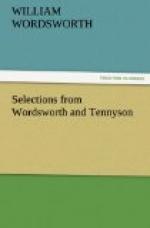Confederate, imitative of the chase 35
And woodland pleasures,—the resounding horn,
The pack loud-chiming, and the hunted hare.
So through the darkness and the cold we flew,
And not a voice was idle; with the din
Smitten, the precipices rang aloud; 40
The leafless trees and every icy crag
Tinkled like iron; while far-distant hills
Into the tumult sent an alien sound
Of melancholy, not unnoticed, while the stars,
Eastward, were sparkling clear, and in the west 45
The orange sky of evening died away.
Not seldom from the uproar I retired
Into a silent bay, or sportively
Glanced sideway, leaving the tumultuous
throng,
To cut across the reflex of a star;
50
Image, that, flying still before me, gleamed
Upon the glassy plain; and oftentimes,
When we had given our bodies to the wind,
And all the shadowy banks on either side
Came sweeping through the darkness, spinning
still 55
The rapid line of motion, then at once
Have I, reclining back upon my heels,
Stopped short, yet still the solitary
cliffs
Wheeled by me—even as if the
earth had rolled
With visible motion her diurnal round!
60
Behind me did they stretch in solemn train,
Feebler and feebler, and I stood and watched
Till all was tranquil as a summer sea.
1-14. In what other poems does Wordsworth describe “the education of nature?”
8. Nature’s teaching is never sordid nor mercenary, but always purifying and ennobling.
10. PURIFYING, also SANCTIFYING (l. 12), refer to “Soul” (l. 2).
12-14. Human cares are lightened in proportion to our power of sympathising with nature. The very beatings of our heart acquire a certain grandeur from the fact that they are a process of nature and linked thus to the general life of things. It is possible that “beatings of the heart” may figuratively represent the mere play of the emotions, and thus have a bearing upon the words “pain and fear” in line 13.
15. FELLOWSHIP. Communion with nature in her varying aspects as described in the following lines.
31. VILLAGE CLOCK. The village was Hawkshead.
35. CONFEDERATE. Qualifies “we,” or “games.” Point out the different shades of meaning for each agreement.
42. TINKLED LIKE IRON. “When very many are skating together, the sounds and the noises give an impulse to the icy trees, and the woods all round the lake tinkle.” S. T. Coleridge in The Friend, ii, 325 (1818).
42-44. The keenness of Wordsworth’s sense perceptions was very remarkable. His susceptibility to impressions of sound is well illustrated in this passage, which closes (l. 43-46) with a color picture of striking beauty and appropriateness.




